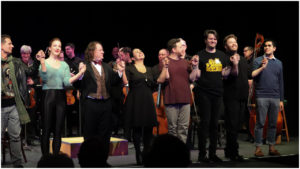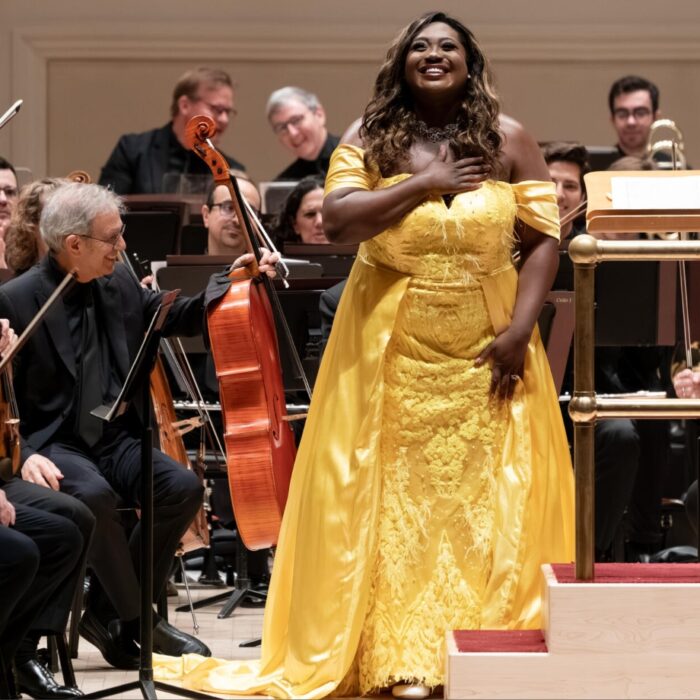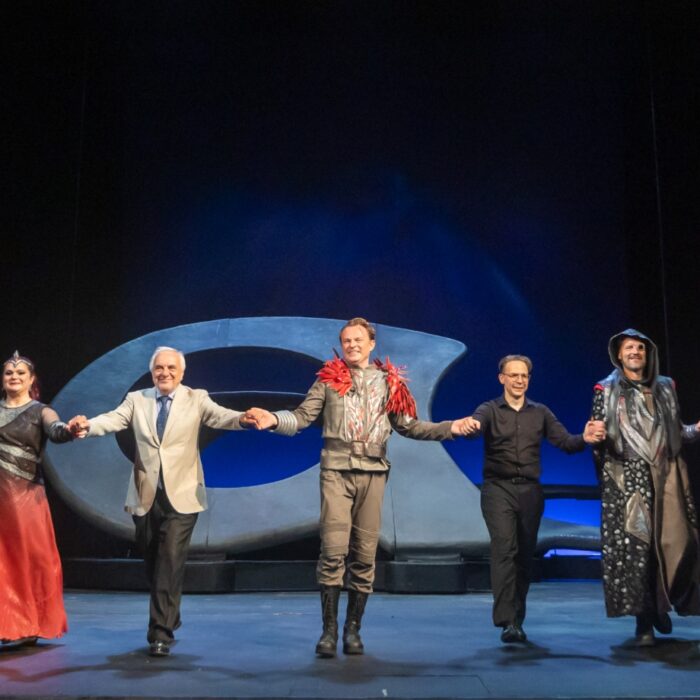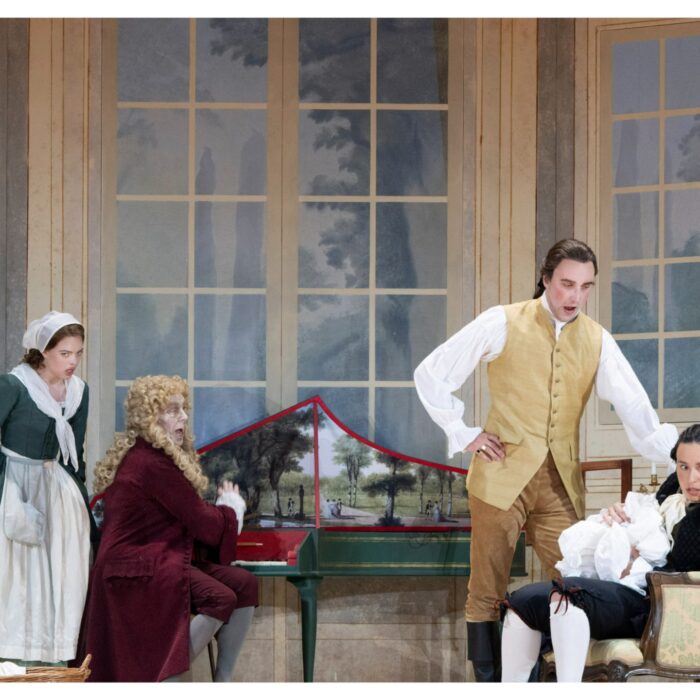
Seton Hall Classical Concert Series 2019-20 Review: La Bohème
Strong Performances Need Not Come in Large Packages
By Logan MartellOn November 21, 2019, Seton Hall’s Classical Concert Series, along with the Charles and Joan Alberto Italian Studies Institute, presented a semi-staged concert performance of Puccini’s “La Bohème.” Focusing on the music and drama, the artists and orchestra, under the baton of Jason C. Tramm, delivered a humorous yet very heartfelt interpretation of the opera.
On his approach to the work, director Stefanos Koroneos says “My ‘Bohème’ is a rebellious answer to the idea of a city united by a same culture. I am exploring the multi-cultural aspects of a city placed in modern days with personalities larger than life who live and gravitate around Mimì. Through the ups and downs of an extraordinary existence, my ‘Bohème’ characters navigate through everyday life with the confidence, and ticks, of youth. It is Mimi who brings all those characters together. All together united in the good, bad, and tragic.”
Together
As Rodolfo, tenor Michael Boley gave a dramatically thorough performance. His fun interactions with his fellow Bohemians carried over nicely for his initial meeting with Mimì, reinforced by his sly expression with his phrase “Oh God! My candle just went out too!” We also see this Rodolfo find Mimì’s key, only to pocket it and keep searching with her in the dark, until their hands finally met.
His rendition of “Che gelida manina” saw him firmly outline the introductory phrases, though for his climactic high C, Boley’s voice cracked in the upper passagio; he caught himself quickly and took it down to a more manageable height. Recovering to a soft conclusion, Boley rejoined Sampson for their duet “O soave fanciulla,” with their powerfully charged harmonies making for a nice close to the first act.
In Act three, his own pain regarding Mimì’s health was compelling to watch as his initial false happiness melted to a more vulnerable bearing, cresting towards a painfully stricken B-flat with the phrase “her poor cheeks are flushed!” This charge lasted through their quartet, as Mimì and Rodolfo agreed to postpone their breakup until spring.
In the role of Mimì, Kristin Sampson carried herself with a delicate but lively energy that heard expression through her singing as well. Her entrance in Act one came after a rather hurried knock, but she entered more bashfully, displaying a rich soprano through her opening lines.
Her rendition of “Si, mi chiamano Mimi,” saw her thoughtfully introduce herself, as if just figuring it out while putting it into words; this made it all the more meaningful when she crested for the rising phrases of passionate certainty such as “April’s first kiss is mine!”
Sampson’s numbers in Act three bore a tenderness that highlighted Mimi’s suffering heart, as heard when she confided to Marcello about Rodolfo, “He loves me but he flees from me!” Her number, “Donde lieta usci,” was full of a soft, hesitant beauty as she arranged for her things to be sent, and coloring her last, sustained “Goodbye, without hard feelings.”
In Act four, her weaker, lyrical phrases were tinged with mortality, but handled the vocal leaps well. Her phrase “you should have said ‘beautiful as the sunset,’ was as touching as it was bittersweet. As she reminisces with Rodolfo, Sampson seemed to take on a healthier vocality, lending some sense of hope as she died peacefully.
Opposites
As Marcello, Adam Cioffari displayed a remarkably trusty bass-baritone that did not lack for emotional color. His opening lines showed a light-hearted character that came across well as he and the other bohemians finessed their way to expelling the rent-seeking Benoit.
Act two saw the character well on the rebound from his prior romance with Musetta, directing his phrase of “Which of you girls wants love?” to the female-heavy chorus, while tingeing his later exchanges with Mimi with a fair amount of jadedness. His earlier interactions with Musetta strongly conveyed his refusal to play her games shortly before succumbing to them entirely, his voice being a strongly-grounded compliment to Burgess’ electric tones. After their bickering quartet in Act three, the fourth act saw Cioffari almost painfully smitten with Musetta as he described her haunting influence on his art.
As Musetta, Susanne Burgess demonstrated wonderful vocal prowess, taking the character to sonorous and extravagant heights. Making her entrance with a haughty laugh from the audience, Burgess soon exchanged barbed phrases with Marcello, doing everything in her power to gain his attention, even engaging in stretched while wearing leather tights.
Her rendition of “Quando m’en vo” was rich and full of sassy body language, with Burgess humorously and sensually breaking the fourth wall as she rested herself briefly on one of the cellists. Her conclusion was deliberately strong without becoming shrill or overbearing. Taking desperation to new depths, Burgess quickly dropped to the floor while combining it with a comical, descending wail; the physical coordination of this move seemed to come easily to Burgess. Raising one of her legs perpendicular to the floor, this final push was what sent Cioffari’s Marcello over the edge as the orchestra swelled for their steamy, dramatic reunion.
Her Act three fight with Marcello saw them angrily exchanging text messages from opposite sides of the stage, visually flanking the pairing of Rodolfo and Mimi within their own romantic drama.
Rounding out the Bohemians were Stefanos Koroneos and Eric Lindsey as Schaunard and Colline, respectively. As Schaunard arrived with much-needed food, carrying bags from Trader Joe’s and a nonchalant smile, he soon regaled his famished friends with his story of seducing the maid and poisoning his employer’s parrot. Their cheerful harmony of “It’s Christmas Eve” saw the men in fine spirits before Benoit came knocking at the door. Together, the four were consistently in sync and made a cohesive, and comedic, group.
In Act two they, all joined nicely as they repeated Musetta’s phrases while she handed the check off to the missing Alcindoro, quickly coming to a unanimous decision and harmony. Act four saw them in fine form as they returned to a more jovial way of life, trading jokes, dancing, and even grappling before Musetta and Mimi’s entrance.
For Lindsey’s aria “Vecchia zimarra senti,” Tramm and orchestra took things in a slower direction, allowing Lindsey’s profound bass to highlight the phrases with a fleeting tenderness that captured the difficulty in saying goodbye.
While Thursday’s performance had a share of bumps in the road, the artists recovered well and the audience took it all in good spirit, with no shortage of applause. This iteration of the Classical Concert Series more than proves that strong performances need not come in large packages.



